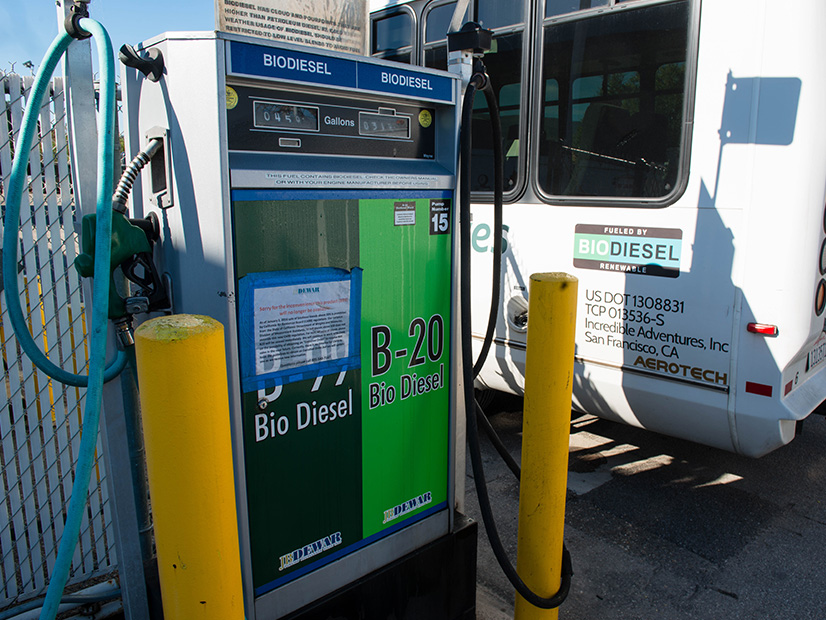
A bill that would establish a low-carbon fuel standard in New Mexico was awaiting a House vote on Tuesday, as the state legislature races toward the end of the 2023 session.
House Bill 426, sponsored by Rep. Kristina Ortez (D), cleared two committees and was sent to the House floor for a vote. The bill still needs approval from both the House and Senate before the session ends at noon on March 18.
The bill would direct the Environmental Improvement Board to establish a standard to reduce the carbon intensity of transportation fuels used in the state by at least 20% below 2018 levels by 2030 and by at least 30% by 2040.
The rule would include a system for trading credits. Low-carbon fuels might include ethanol, biomass-based diesel, natural gas, low-carbon hydrogen and electricity.
1st in the Southwest
California was the first state to adopt a low-carbon fuel standard (LCFS), followed by Oregon and Washington. Proponents say HB 426 would make New Mexico the first state in the Southwest with a clean fuel standard. The bill is backed by Gov. Michelle Lujan Grisham’s administration.
But this is at least the third try for the legislature to pass a LCFS bill. Last year’s version of the bill, Senate Bill 14, died on the final day of the 2022 session with a tie vote in the House. The 2021 version of the bill, SB 11, stalled on the House floor.
HB 426 initially seemed to have momentum. The House Energy, Environment and Natural Resources Committee passed the bill by a 7-4 vote on Feb. 23. The House Government, Elections and Indian Affairs Committee voted 5-3 on March 4 to approve it. Republican lawmakers voted against the bill in both hearings.
Ortez said during the second committee hearing that HB 426 would reduce greenhouse gas emissions and attract clean-fuel businesses to the state. Producers of fuels with a carbon intensity lower than the state standard would earn credits that could be sold to producers of fuels that exceed the standard. The standard would become more stringent over time.
Ortez said that while the bill is one tool to reduce emissions, “it’s not the end-all, be-all climate change bill.”
And what the bill doesn’t do, she said, is “turn New Mexico into California.” She said California’s high gas prices are due to excise taxes, which New Mexico doesn’t have. A fact sheet from the state’s Climate Change Bureau says the clean fuel standard would lead to “almost no increase of prices at the pump.”
Price Impacts Debated
Rep. Martin Zamora (R), who voted against HB 426, said the bill would do nothing to reduce pollution because producers of high-polluting fuels could simply buy credits. And because those producers must buy credits, gas prices will go up, he said.
“The customer, the poorest of the poor in our state, will wind up paying a higher cost for fuel,” Zamora said.
Farmers would face higher fuel costs because of the bill, Zamora said, leading in turn to higher prices for food and clothing.
During the Feb. 23 hearing, Climate Change Bureau Chief Claudia Borchert pointed to an April 2022 report from consulting group Bates White, which looked at the impact of California’s LCFS on fuel prices in the state. The study was commissioned by the Low Carbon Fuels Coalition.
The cost of crude oil is the main determinant of fuel prices, the study said. Taxes and cap-and-trade costs are other factors, and when combined with crude oil costs, explain 90% of gasoline pricing. The remaining “unexplained” component of fuel costs was not linked to the low carbon fuels program, the study found.
Under pricing in place at the time of the study, consumers could save money by buying low-carbon fuel alternatives, the report said.
HB 426 directs the Environment Department to convene an advisory committee to collect stakeholder feedback before issuing a draft rule.
The bill says the department should look at clean fuel standards in other states when drafting the rule and work with other jurisdictions on regional reductions in greenhouse gas emissions.
Under the legislation, investor-owned utilities would be required to use revenue they receive from clean fuel credits for transportation electrification, with at least half the proceeds benefiting disproportionately impacted communities.
HB 426 also calls for finding ways to limit costs to consumers from the clean fuel program.



